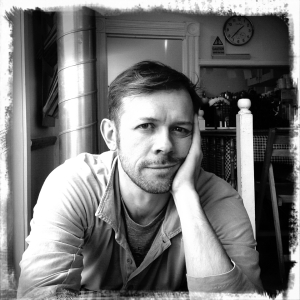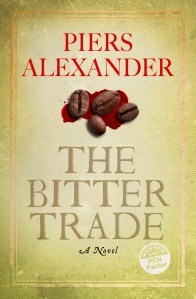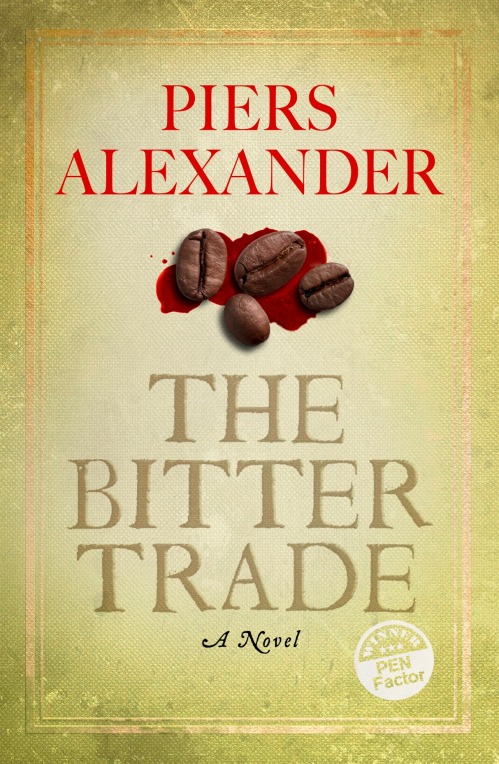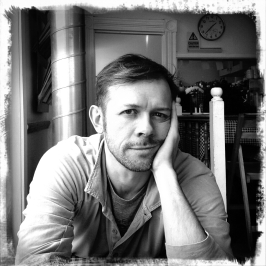Today I have an interview with Piers Alexander, author of The Bitter Trade, which is set in 17th Century London during the time of commerce, trade, and the Glorious Revolution. The Bitter Trade won the PEN Factor at The Literary Consultancy’s Writing In A Digital Age Conference. Jury Chair Rebecca Swift (Author, Poetic Lives: Dickinson) said: “The Pen Factor jury selected The Bitter Trade based on the quality of writing, the engaging plot, and the rich and unusual historical context. Dazzling and playful!”
Hi, Piers! Welcome to Oh, for the Hook of a Book! I’m thrilled to have you drop by today for a discussion! We have some interesting topics to discuss. I really liked your debut book, The Bitter Trade. Readers can see my review HERE. I can’t wait to learn more!
Piers: Hi Erin! Thanks for having me. Great blog title – and I love that you are proud to do many different things. Death to pigeonholing artists!
Erin: Come in and have a seat and let’s discuss your book, The Bitter Trade! In honor of the coffee trade that your novel features, I’ll brew your favorite coffee while you have a seat in my library in one of those comfortable chairs over by the window.
What is your favorite coffee? Black or sugar and cream?
Piers: Black, bitter, loamy if you please.
Erin: Wonderful, I’ll pour! As for me, I take my tea with cream and sugar, so I take my coffee much the same. Now that we are settled in, let’s get started.
Q: The Bitter Trade takes place in the late 17th Century London, when William of Orange of the Dutch threatened to overthrow England. What first perked your interest in this historical time period?
A: I was reading Flesh in the Age of Reason by the historian of philosophy, Roy Porter, and got very excited about the flourishing of ideas from the late seventeenth century onwards. I didn’t know anything about the Glorious Revolution, but I was sitting outside the London Library (nursing a coffee, of course!), and saw the statue of William in St James’s Square. I googled him, and realised that 1688 was the perfect setting. Conspiracy, royal family feud, rampant commerce, an explosion of ideas… Wonderful.
Q: You have an amazing story about how you came to be able to write this book, and we’ll get to that later, but first, with all the work it took just to make time to pen this novel, what made you decide, “this story…this is the one?”
A: Well… I started with a story about an eighteenth century Scots philosophy student who gets embroiled in secret duelling clubs. This redheaded, troublemaking chancer called Calumny Spinks popped up as I was scribbling in my diary, one windswept day in a Cornish cottage, and my wife (Rebecca Promitzer), who is an award-winning filmmaker, scriptwriter, novelist and singer-songwriter – you’ll like her! – told me that Cal was MUCH more interesting than the other guy. She was right, and I went with it.
Erin comments: Rebecca is wise! Tell her I said so, and she does sound like someone I’d like! 😀
Q: There are so many wonderful facets to the 17th Century in England. People can keep turning out book after book of original stories that sometimes it seems they all couldn’t possibly fit into one century. What type of characters of the many various sects of people available did you choose to focus your book on? Why?
A: In short: outsiders. You’ll know this from your own writing, and all the historical fiction you read: all these long-dead people queue up at your desk and demand to have their stories told. Huguenot refugees. Foreigners. LGBT characters who had no way to express themselves. The illiterate, those outside the guilds and crafts, lepers… and WOMEN. Women, rapping on my skull, telling me to tell their stories PROPERLY. It’s exhausting.
Erin comments: Characters are so pesky, aren’t they?!! I just love how you are telling women’s stories correctly. Score one for you!
Q: So, what does COFFEE have to do with your novel? Of course, I know that at this time William of Orange of the Dutch was threatening to steal the English crown, and the Dutch of course, were the traders (in fact, my own Dutch ancestors were at the time settling New Amsterdam which is now New York), but for readers, what was so special or interesting about coffee?
A: There’s a special relationship between coffee and books, isn’t there? The writing inspiration that comes after the first sip; the deliciousness of reading with a steaming cup at your side. So first of all, I’m indulging myself and my “little” habit. (Erin comments: A lovely habit!)
But the history of coffee says something profound about the history of European expansion. A drug that started as a mild way for Yemeni mystics to connect with Allah, and ends up fuelling the entire information revolution. Along the way, its secrets are guarded and stolen by French and Dutch adventurers, its trees transplanted to remote corners of the new empires; and coffeehouses themselves bubble and brew with revolution, speculation and wit. Chocolate and tea never quite got the same grip on the imagination and ambition of millions.
Erin comments: Isn’t that amazing? As much as some hate to admit it, we owe a lot of good stuff to ancient cultures!! And I love chocolate too!!
Q: What are the most common themes that your book took on about life or living in the 17th Century? What types of beginnings did the late part of the century procure?
A: The big surprise to me was how important craft was to life in those days. It’s something I never paid attention to at school – like most boys, I loved to read about great heroes and tyrants, not the lives of ordinary people. But Calumny bumps his head against the rules and requirements of getting a trade, and so he ends up becoming a mimic, a smuggler, a “roustabout” as the BBC called him: and that’s the bitter trade. To pretend to be something you’re not, just for money; to not have a skill and craft of your own.
I mentioned the lives of women above. I never felt like I had to pity my female characters: they’re tough and adaptable, but it was still a shock to learn of all the petty restrictions and violences, as well as the grand ones, and to imagine my loved ones having to cope with all that.
The last one – and it’s below the surface – is that England was still coming to terms with itself, nearly fifty years after the Civil War. I grew up in the Seventies and Eighties, and our identity was heavily influenced by the Second World War, so perhaps that’s an influence; but in 1688 I discovered a world of suspicion and brotherhood and secrets that stemmed from a long-ended conflict.
Q: What was the most amazing part of your research? What did you like learning the most and what was one of the most surprising or interesting thing that you came across?
A: This will sound strange, but the best research I did was not historical, it was into the characters. Day by day and year by year they told me their stories, snapped at me when I got them wrong, suggested scenes and activities that took the story in another direction. I didn’t really believe that ideas and characters came from outside writers before – but this book showed me that they have lives of their own.
Q: With this question, I’m not asking you to compare your book to others or just call your book unique, but rather, can you explain to reader why your book might be different or the same as others of the time period?
A: I’m reading a really good novel set in 1678, a crime thriller by Robert J Lloyd called The Bloodless Boy. Interestingly, the author delves into some of my favourite elements: London’s buried rivers, the curiosities of language, the Royal Society, and the hangover from the Civil War. Now that lots of people have read The Bitter Trade, I’ve learned that there are some quite distinct things I’ve done: using a first person narrative, having a very flawed and misleading hero, and being unashamedly interested in commerce as well as violence and politics. Cal counts his pennies and glories in his temporary wealth: something that’s very familiar in today’s world of reality TV and instant Twitter trending.
Q: How do you craft and create your characters? Which character is one of your favorites and why?
A: They always appear in the middle of a scene I’m writing, announcing themselves with an insult or a contradiction; then I write up a little paragraph about them, usually in their voice; then I finish the draft, wonder why the heck they did what they did, and have to rewrite the whole story to honour their intentions. One of my favourites is the leprous coffeehouse owner Mistress John Hollow: a fearless, wisecracking, creative badger of a woman who single-handedly reversed one of my plot threads to her own advantage. Now THAT’S a lady.
Erin comments: HA!
Q: I know that you have had some corporate jobs, owned businesses, and been successful, just to also keep halting that thought to write and get broke in between, or something as such! Can you tell us how your dream of writing came to be fulfilled and what lessons did you learn along the way?
A: To make a very long story short: I wrote half a story when I was 22 and gave it up to get a job. I quit my job, set up a business and sold it to write a story. I wrote a story and ran out of money. Then I knew I had to find a way to build businesses AND write. Which is hard, and risky, and painful, and incredibly rewarding. And now I love it all.
What did I learn? Don’t let other people tell you what isn’t possible. Don’t be fooled by the illusion of solvency. Never give up on what you love. And a little piece of advice to your readers: don’t do what I did. It was genuinely crazy.
Q: How do manage your writing and the rest of your life? What enables you to make writing a priority through the hard work of it for little pay (a question all prospective writers are asking!)?
A: I write 2-3 mornings a week, at least an hour and at most two and a half hours. I write a thousand words an hour, so in six months I finished the draft of my second novel.
I do things slower than other writers, I think. I write fast, but I don’t write every day and I do lots of drafts. Most of all, I like taking my time over a novel. If I wrote one a year I don’t think it would be as rewarding for me or the reader.
The priority thing: just do it first thing. Then your whole day is filled with warm light and happiness!
Erin comments: Isn’t that the truth?!! Writing brings so much sunshine!
Q: What are the BEST parts of writing to you?
A: About half an hour before I finish a session, it’s just humming. The characters have come alive, new locations and accents are suggesting themselves, the last sip of coffee is still with me, and the street is still quiet.
I’ve just moved into a house behind Alexandra Palace in London. My study looks across at the grove, and beyond it the vaulted glass ceilings of the palace. Witches and pagans used to make a pilgrimage to the mossy well my neighbourhood is named for: when Cecil Rhodes built “the people’s palace” on their ley node, they allegedly cursed it. It’s burned to the ground TWICE. Ha!
Erin comments: Amazing, and very cool!
Q: What else do you hope to write about? Another part of the 17th Century? Or perhaps, a different time period completely?
A: I am just finishing Scatterwood, which moves from coffee to sugar: Cal becomes a runaway in Jamaica. The final part, Calumny’s Republic, will be a rather complex and shocking affair set in Virginia in the new century. After that… it’ll be a different era, but I am still playing with ideas and visiting new places. For fun as well as research!
Q: What are your plans for the future in addition to anything you mentioned in the above question?
A: I have a children’s book in the works; I think I’ll live in a new country one day; and I dream of owning a noisy sculpture studio in a remote place by the sea. Other than that, I hope it has the qualities of the present: love, Rebecca, dogs, good friends and spicy cooking.
Erin comments: You forgot coffee!! 🙂 I would love to hear about the children’s book! What wonderful dreams, I hope you accomplish them all and enjoy the rest. I love spicy cooking too!
Q: what are some of your own favorite books to read or favorite all time authors?
A: I used to reread books a lot as a teenager: Wilbur Smith, George MacDonald Fraser, you name it. These days, I read fewer and I hope better books. Recent favourites are Boxer, Beetle by Ned Beauman and Gillian Flynn’s Gone Girl. Patrick O’Brian’s Aubrey/Maturin stories are wonderful examples of how to combine thrilling action, historical detail and tear-inducingly great literary prose.
Q: If you could sip coffee with anyone in history, who would it be?
A: Louis XIV. What a terrible reputation he has, and what a huge character he must have been. I’d make sure I brewed it myself though…
Erin comments: Oh, he is quite interesting!
Q: Where can readers connect with you?
A: www.piersalexander.com; @thebittertrade on Twitter; Facebook.com/thebittertrade; and I am quite often found reading aloud at coffee festivals!
Erin: Thank you so much Piers for stopping by and chatting with me. It was delightful to meet you and if you found any good Dutch historical references, I may be contacting you in the future as I research my own books. 🙂 Best wishes on your writing career!
Piers: Thank you Erin. The coffee was delicious, the company exquisite, and I hope to read your stories soon. And yes I do have those references… See you in the past!
Erin: That’s excellent!! I look forward to it. Thank you!
Publication Date: April 7, 2014
Tenderfoot
Formats: eBook, Paperback; 448p
Genre: Historical Adventure/Thriller
Read an Excerpt. Listen to an Excerpt.
In 1688, torn by rebellions, England lives under the threat of a Dutch invasion. Redheaded Calumny Spinks is the lowliest man in an Essex backwater: half-French and still unapprenticed at seventeen, yet he dreams of wealth and title.
When his father’s violent past resurfaces, Calumny’s desperation leads him to flee to London and become a coffee racketeer. He has just three months to pay off a blackmailer and save his father’s life – but his ambition and talent for mimicry pull him into a conspiracy against the King himself. Cal’s journey takes him from the tough life of Huguenot silk weavers to the vicious intrigues at Court. As the illicit trader Benjamin de Corvis and his controlling daughter Emilia pull him into their plots, and his lover Violet Fintry is threatened by impending war, Cal is forced to choose between his conscience and his dream of becoming Mister Calumny Spinks.
Praise for The Bitter Trade~
“A fantastic debut novel” – Robert Elms, BBC Radio London
“The ambitious, cheeky Calumny Spinks is a great guide through the sensory overload of 17th century London, in an adventure that combines unexpected insights with just the right amount of rollicking ribaldry. I hope it’s the opener to a series.” – Christopher Fowler, author of the Bryant and May novels
“This debut novel is a gripping evocation of late seventeenth century London, rich in persuasive dialect and period detail and with a bold protagonist. An unusual thriller that just keeps you wanting to know more about the many facets of this story. You’ll never view your coffee in quite the same way again.” – Daniel Pembrey, bestselling author of The Candidate
“A very exciting and superbly researched novel” – Mel Ulm, The Reading Life
Buy the Book~
Amazon UK (Paperback)
Amazon US (Kindle)
Barnes & Noble (Nook)
iTunes
Kobo
About the Author, Piers Alexander~
 Piers Alexander is an author and serial entrepreneur. After a successful career as CEO of media and events companies he became a Co-Founder and Chairman of three start-up businesses.
Piers Alexander is an author and serial entrepreneur. After a successful career as CEO of media and events companies he became a Co-Founder and Chairman of three start-up businesses.
In 2013 he was awarded the PEN Factor Prize for The Bitter Trade. He is currently working on the sequel, Scatterwood, set in Jamaica in 1692.
For more information visit Piers Alexander’s website. You can also find him on Facebook, Twitter, and Goodreads.
Tour Schedule: http://hfvirtualbooktours.com/thebittertradeblogtour
Hashtags: #TheBitterTradeBlogTour #HistoricalThriller
Twitter Tags: @hfvbt @BitterTrade





